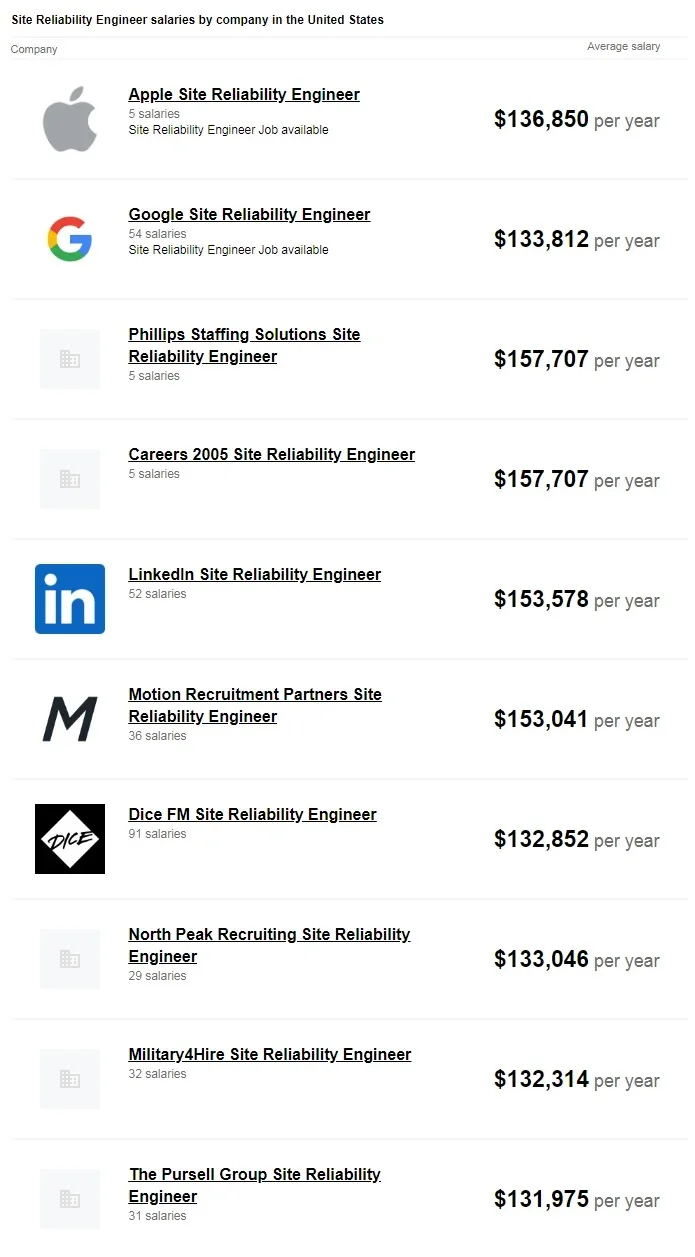How often do you focus on adopting a new fashion trend and keeping up with it forever?
We bet that hasn’t happened even once. Because soon before the fashion trend fades, a
new one comes on board and you are all hyped about it. Isn’t that right?
The same thing happens with technology as well. Once a new one comes on board, that
becomes the most trending one! Such as Site Reliability Engineering (SRE), the much-
an adored the bridge between development and operations nowadays. By now, there must be a lot
of questions in your mind.
Some of them are maybe:
In this blog, we are going to answer all of the questions mentioned above. If you have any
more questions, you can always type it down in the comment section.
Do you know how much does a Site Reliability Engineer gets paid? It starts from $136,836
per year. Can you believe this?

Source: Indeed
But why Site Reliability Engineers are in such high demand? Let’s see from the definition.
Site Reliability Engineering is basically creating a bridge between Development and
Operations departments. It is a discipline that incorporates aspects of software engineering
and applies them to infrastructure and operations problems. The main goals are to create
scalable and highly reliable software systems.
According toBenjamin Treynor, founder of Google's Site Reliability Team, SRE is"what
happens when a software engineer is tasked with what used to be called operations"
So, from where did the concept of SRE come from? To tell you that, we have to go back to
the year 2003. In that year, Benjamin Treynor was in charge of a production team whose
end goal was to make Google websites more available so that they are always able to
provide service.
Being a software engineer, Benjamin trained the way to work in a way the
way he could have worked if he were a Site Reliability Engineer. He tasked the team to
spend half of their time with the operations team so that they can understand the problem
and contribute to the development in a better way. The team Benjamin Treynor managed, is
Google’s SRE team now.
You might ask now, we already have DevOps dealing with both development and
operations. Why do we need SRE then? Is there any similarity between these two? Let’s
look into the principles and key aspects of both to find out!
From ourprevious blogs ITIL Vs DevOps, you all know about DevOps already. Right?
DevOps is basically a set of practices to build a culture of collaboration between the
development and operations teams.
The SRE principles are also aligned in a way so that all the above-mentioned points can be achieved. Let’s see how that can be done!
1. Reduce organizational silos:
SRE shares ownership with developers to create shared responsibility
SREs use the same tools that developers use, and vice versa
2. Accept failure as normal:
SREs embrace risk
SRE quantifies failure and availability in a prescriptive manner usingService Level Indicators and Service Level Objectives
SRE mandates blameless post mortems
3. Implement gradual changes:
SRE allows developers and product owners to function faster by reducing
the cost of failure
4. Leverage tooling and automation:
SREs have the charter to automate menial tasks away
5. Measure everything:
Hope we cleared the air of confusion here? Now, let’s see what a Site Reliability Engineer
has to be taken care of.
What is the role of an SRE?
We gave you a brief idea about the job role of Site Reliability Engineer.
Take a look at the following points, and you will find out the details:
Remember how the hand of the king used to handle everything on the king’s behalf? Back in
that time, the kings used to choose the most intelligent person of the council to be the hand
because the hand used to look after everything is running smoothly as well as strategizing
everything by collaborating with the king.
A Site Reliability Engineer is also the same. The one on whom the entire project depends
on.
Do you think you’d be interested in choosing this career path? All you need to do is take up
an
SRE trainingand apply for an SRE certification! So what do you think? Ready to do the same?